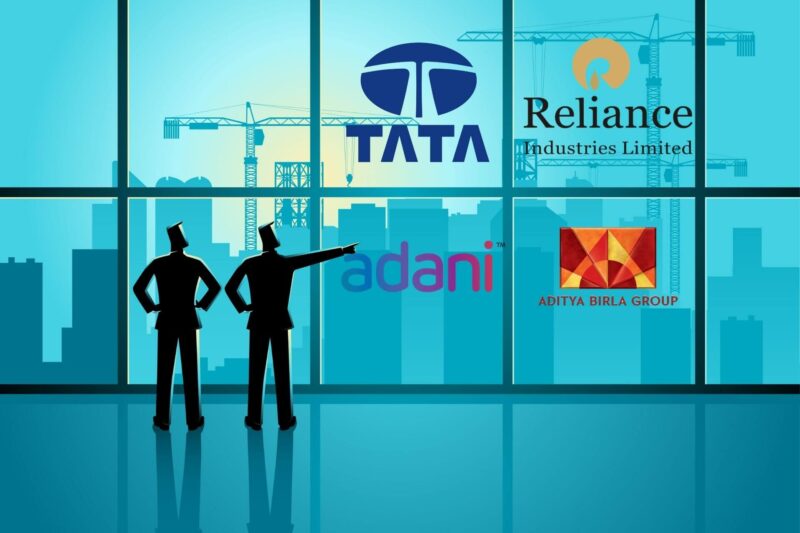Leading Conglomerate Companies in India: Understanding the importance of thriving businesses is crucial to grasp how a country’s economy grows. Financial experts often emphasize that a nation’s prosperity is closely linked to the success and expansion of its businesses. In India, this concept is especially relevant, as numerous conglomerates contribute significantly to the nation’s economic landscape. These conglomerates span various sectors and not only enhance the economy but also represent India on the global stage. This article explores the top 10 leading conglomerate companies in India as of 2024, highlighting their diverse operations and significant impacts.
Top 10 Leading Conglomerate Companies in India
1. Reliance Industries

Reliance Industries Limited (RIL) is undoubtedly a titan in the Indian business landscape. Founded in 1973 by Dhirubhai Ambani, the company has evolved into a colossal entity with interests ranging from oil and gas to telecommunications and retail. Under the leadership of Mukesh Ambani, RIL has expanded its reach significantly. A landmark moment was the launch of Reliance Jio in 2016, which revolutionized the Indian telecom sector with its ultra-affordable 4G data services. This move positioned India as a global leader in digital connectivity. Today, Reliance continues to innovate with ventures into green energy, showcasing its commitment to future-oriented industries. Projects like JioMart further underline RIL’s relentless drive for expansion and diversification.
2. ITC Limited

Established in 1910, ITC Limited initially focused on the cigarette industry. Over the decades, ITC has diversified its portfolio significantly. It now operates in various sectors, including food, hotels, and information technology. Brands like Aashirvaad and Sunfeast are staples in many Indian households, reflecting ITC’s widespread consumer presence. The company is also known for its environmental initiatives, such as tree planting and sustainable practices. ITC’s continuous innovation in snacks and digital technology underscores its ambition to remain a leading player in multiple sectors for the foreseeable future.
3. Tata Group

The Tata Group, founded in 1868, is one of India’s most esteemed conglomerates. The group has a diverse portfolio, including automotive, IT services, steel, and consumer products. Tata Consultancy Services (TCS) stands out as a global leader in IT services, while Tata Motors owns the luxury car brands Jaguar and Land Rover. The Tata Trusts, a significant philanthropic arm of the group, contribute to various charitable causes. Recently, Tata Neu, a super app designed to integrate the group’s diverse digital offerings, exemplifies Tata’s commitment to leveraging technology for enhanced customer experiences.
4. Adani Group

Founded by Gautam Adani in 1988, the Adani Group has grown to become a major force in sectors such as ports, energy, and agriculture. The group’s ambitious projects include India’s largest private port and the world’s largest solar power plant. Adani’s expansion into airports and defense sectors demonstrates its strategy of pursuing substantial growth opportunities. Despite facing challenges, such as the Hindenburg report controversy, the Adani Group has managed to recover and continue its trajectory of growth.
5. Bajaj Group

The Bajaj Group, established in the 1930s by Jamnalal Bajaj, initially gained prominence as a scooter manufacturer. Over time, the group diversified into various vehicle segments and financial services through Bajaj Finserv. This adaptability highlights the group’s ability to evolve with changing market dynamics. The Bajaj Group also emphasizes social responsibility, with initiatives from the Jamnalal Bajaj Foundation aimed at improving the lives of underprivileged communities. Recently, the group’s focus on electric vehicles reflects its commitment to sustainable transportation solutions.
6. Hinduja Group

The Hinduja Group was founded in 1914 by Parmanand Deepchand Hinduja as a trading company in Iran. Today, it operates in diverse sectors, including banking, healthcare, automotive, and technology. The group’s prominent brands, such as Ashok Leyland, are known for their commercial vehicles. The expansion into healthcare with P.D. Hinduja Hospital demonstrates the group’s commitment to social impact. The Hinduja Group’s wide-ranging interests and its continuous evolution underscore its status as a significant player in India’s business ecosystem.
7. Aditya Birla Group

Founded in 1857 by Seth Shiv Narayan Birla, the Aditya Birla Group started with cotton trading and has since grown into a global conglomerate. The group’s diverse interests span metals, cement, textiles, and telecommunications. Under the leadership of Kumar Mangalam Birla, the group has expanded internationally, operating in 36 countries. Key subsidiaries like UltraTech Cement and Aditya Birla Capital are leaders in their respective fields. The group’s focus on sustainability and community development further enhances its reputation as a responsible corporate entity.
8. JSW Group

Founded in 1982 by Sajjan Jindal, the JSW Group has become a major player in India’s steel industry. The group’s operations extend into energy, infrastructure, cement, and sports. JSW Steel, in particular, is a significant force in the steel sector. The group’s commitment to environmental sustainability is evident in its investments in solar power and clean technologies. Additionally, JSW’s interest in electric vehicles highlights its forward-looking approach and adaptability to emerging market trends.
9. Mahindra Group

The Mahindra Group, established in 1945 by J.C. Mahindra, K.C. Mahindra, and Malik Ghulam Muhammad, has a rich history of innovation. The group operates in various sectors, including automotive, aerospace, agriculture, and information technology. Mahindra & Mahindra is renowned for its robust SUVs and utility vehicles. The group’s focus on electric vehicles and sustainable urban development reflects its commitment to addressing contemporary challenges. Tech Mahindra, another key component of the group, serves the global IT services market. The Mahindra Group’s efforts in affordable housing and green initiatives demonstrate its dedication to societal progress.
10. Godrej Group

Founded in 1897 by Ardeshir Godrej and Pirojsha Burjorji Godrej, the Godrej Group has established itself as a household name. The group’s diverse portfolio includes products ranging from personal care items to home appliances and locks. Known for its emphasis on quality, Godrej is a trusted brand in many Indian homes. Godrej Properties, a subsidiary, is recognized for its eco-friendly and aesthetically pleasing residential developments. The group’s enduring success is a testament to its ability to maintain high standards and adapt to changing consumer needs.
Conclusion
These leading conglomerate companies represent the pinnacle of India’s business sector, each contributing significantly to the country’s economic growth. Their diverse operations, innovative approaches, and commitment to social responsibility reflect the dynamic nature of India’s business landscape. For investors and stakeholders, these conglomerates offer promising opportunities due to their robust market presence and forward-looking strategies. As India continues to evolve, these companies are likely to remain at the forefront of its economic and industrial progress.
















